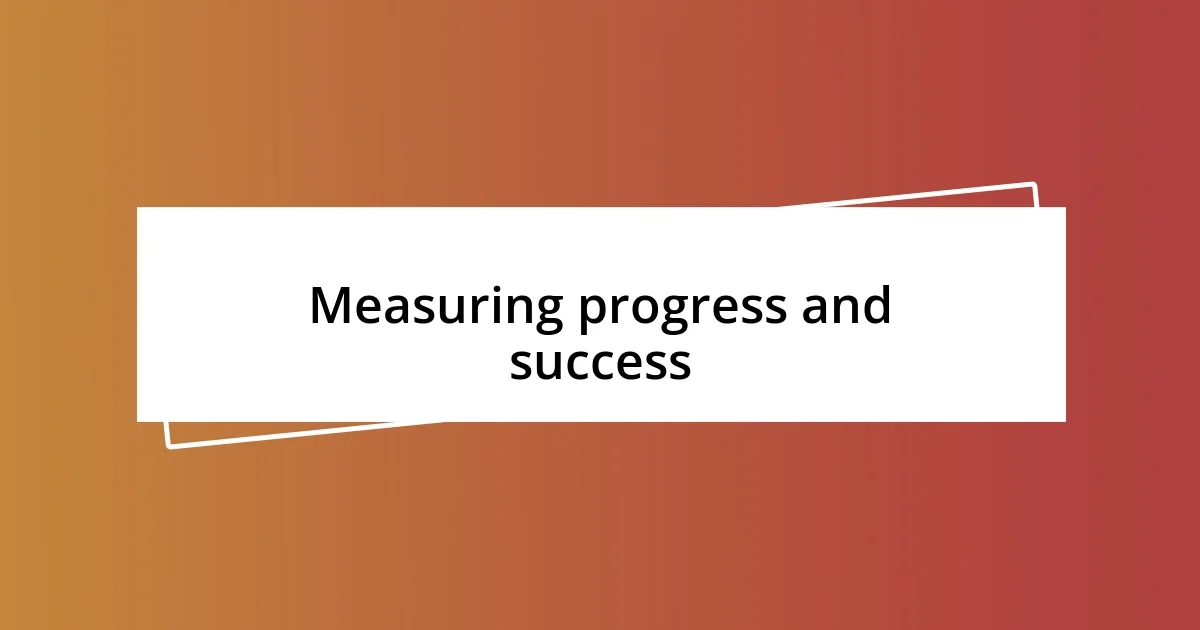Key takeaways:
- The coach emphasizes the significance of creating a supportive environment that fosters resilience, teamwork, and a love for the game among young athletes.
- Effective communication, including active listening and positive reinforcement, is crucial for building trust and understanding the needs of each athlete.
- Measuring progress should focus on personal growth and emotional development rather than solely on performance statistics, celebrating small victories and individual goals.

My journey as a coach
When I first stepped on the field as a coach, I was a bundle of nerves mixed with excitement. I remember that first practice vividly—my young athletes were brimming with energy, and I felt like I was part teacher, part cheerleader. Watching their eyes light up as they grasped a new skill was incredibly rewarding, reminding me just how impactful coaching can be in shaping their confidence and passion for the sport.
One moment that stands out in my journey occurred during a championship game. I watched my players, each one pouring their heart and soul into the match. As the intensity rose on the field, I found myself wondering: how had we grown so much together? It struck me then that my role wasn’t just about teaching techniques; it was about fostering resilience, teamwork, and a love for the game that would stay with them long after the final whistle.
Looking back, I realize that my journey as a coach has been filled with valuable lessons—about patience, communication, and the importance of creating a positive environment. I often ponder how I could better serve my athletes, and each challenge has pushed me to improve not just as a coach, but as a mentor. Engaging with these young athletes has taught me far more than I ever anticipated, and I cherish every moment spent guiding them on their own journeys.

Coaching philosophy and approach
Coaching philosophy is the foundation upon which I build my approach with young athletes. I firmly believe in the principle that every child is unique, and that individual strengths should be celebrated. This perspective brings the joy of discovery into our practices. For instance, I recall a young player who struggled with self-doubt. By focusing on his small wins in practice, I could see his confidence building week by week—each new skill learned became a stepping stone, reaffirming the idea that belief in oneself is essential.
My coaching approach also emphasizes creating a supportive environment. I remembered an instance when a team faced a tough loss. Rather than dwelling on the defeat, we gathered for a team talk, focusing on what we could learn from the experience. It turned into a bonding moment, helping the players realize that losses are part of their journey. That conversation opened their eyes to resilience; they learned that overcoming challenges together strengthens both their skills and camaraderie.
I strive to promote a culture of growth instead of perfectionism. I’ve seen firsthand how young athletes flourish when they feel safe to take risks. During a training session, I encouraged players to experiment with new techniques. The excitement was palpable, and seeing them light up when they executed these new moves was unforgettable. Taking this approach has not only enriched their playing skills but also instilled a sense of curiosity and love for learning that I hope remains with them for life.
| Coaching Philosophy | Coaching Approach |
|---|---|
| Focuses on individual strengths | Creates a supportive environment |
| Encourages self-belief | Promotes teamwork and resilience |
| Celebrates progress | Fosters curiosity and love for learning |

Developing strong communication skills
Communicating effectively with young athletes is a crucial aspect of coaching that often makes a significant difference in their development. I can’t emphasize enough how vital it is to speak their language—using terms they understand and expressions that resonate with their experiences. For example, during a particularly spirited practice, I decided to incorporate playful metaphors related to their favorite cartoons to describe certain plays. Their laughter and engagement showed me that relating to them on a personal level not only improved their comprehension but also created a more enjoyable atmosphere for learning.
Here are some key strategies I’ve found effective in developing strong communication skills with my athletes:
- Active Listening: I always make it a point to listen to their concerns or ideas, showing them they matter.
- Positive Reinforcement: Acknowledge their efforts, no matter how small; it builds confidence and a sense of belonging.
- Clear Instructions: Keeping directions concise and straightforward is essential to ensure everyone understands the game plan.
- Use of Non-Verbal Cues: I rely on gestures and facial expressions to express encouragement, especially when words might not reach them.
- Engagement through Questions: I frequently ask them open-ended questions to foster dialogue and think critically about their performance.
Acknowledging their thoughts and feelings creates a bond that empowers them. I distinctly remember a time when one of my athletes hesitated to express her feelings after a tough practice. I encouraged her to share her thoughts, reassuring her that it was a safe space for all emotions. When she finally voiced her struggles, it sparked a deeper conversation among the team, highlighting shared experiences and forging stronger connections. This incident not only made her feel heard but also nurtured a culture of openness that benefited everyone on the squad.

Creating effective training programs
Creating effective training programs requires a deep understanding of each athlete’s unique abilities and goals. I remember the time I needed to develop a tailored training plan for a young sprinter who struggled with her starts. By observing her technique closely and incorporating drills specifically targeting her explosive power, we were able to improve her start significantly in just a few weeks. It made me realize how important it is to personalize training regimens to enhance performance and keep athletes motivated.
One of the key elements I incorporate into my training programs is variety. Keeping sessions fresh and engaging is essential to maintain young athletes’ enthusiasm. For instance, I introduced themed practice days where we’d focus on specific skills, like agility or endurance, while incorporating fun games and challenges. The laughter and excitement among the athletes were palpable, and I noticed a marked improvement in their engagement levels. Isn’t it fascinating how simple tweaks can transform their attitude towards training?
Moreover, I’ve learned that open communication with athletes when designing these programs is critical. I often ask for their feedback, like, “What part of our practice do you enjoy the most?” This dialogue not only empowers them to take an active role in their own development but also helps me refine my approach to align with their needs. Just last month, I had one athlete express a desire to focus more on strength training. This insight led us to adjust our program, incorporating weights and resistance exercises, and I’ve seen remarkable progress since. It’s moments like these that remind me how collaboration can significantly enhance the training experience.

Understanding young athletes’ needs
Understanding the needs of young athletes is like peeking into their world—each one is unique with their own aspirations, fears, and motivations. I recall coaching a group where each athlete had their personal dreams, from being an Olympic champion to just having fun with friends. Listening to their goals created a foundation for trust, and I felt privileged to be a part of their journey. Have you ever wondered how pivotal it is to align their goals with your coaching methods? This connection not only motivates them but also helps them stay committed to their training.
Nutrition and mental health are also crucial aspects that I’ve come to appreciate in coaching young athletes. I gained insight into this when one athlete shared her struggles with juggling school pressures alongside sports. It dawned on me that they often face challenges beyond the field. So, I started incorporating discussions about healthy eating habits and stress management into our sessions. I was amazed at how it shifted their mindset—suddenly, they were more engaged, not just physically but emotionally too.
Lastly, I realized the significance of recognizing their emotional rollercoaster as young competitors. I still remember witnessing a young athlete burst into tears after a disappointing performance. Instead of brushing it off, I took the moment to talk through those feelings and reassure her that setbacks are part of the process. This conversation not only helped her bounce back but taught the entire team about resilience. Have you considered how addressing emotions can enhance an athlete’s growth? It’s moments like these that highlight our responsibilities as coaches—not just to develop skills, but to nurture the whole individual.

Building confidence and motivation
Building confidence and motivation in young athletes is one of the most rewarding aspects of coaching. I remember a time when a shy athlete, who often hesitated to speak up during practices, scored his first goal in a game. The excitement and pride on his face were contagious, and it made me reflect on how vital small victories are in fostering confidence. Celebrating those moments, no matter how minor they might seem, can boost an athlete’s belief in their abilities. Have you seen how a little recognition can spark motivation?
Encouragement also plays a massive role in this journey. For instance, during a particularly grueling week of training, I noticed a young athlete starting to lag behind during our sessions. Instead of pushing her harder, I chose to highlight her progress over the past month. I told her, “You’ve improved your speed by two seconds—let’s channel that energy!” Her eyes lit up, and suddenly, she was back to giving her all. It’s astonishing how a shift in focus can revitalize an athlete’s spirit. Isn’t it interesting how perspective can ignite a fire within?
Finally, I find that setting achievable yet challenging goals is crucial in maintaining motivation. Early in my coaching career, I made a mistake by pushing a talented athlete to strive for unrealistic benchmarks too quickly. The stress was palpable, and I learned that progress should be celebrated in increments. I now involve my athletes in goal-setting, asking them to reflect on what they want to achieve over the season. One athlete set her sights on mastering a new technique, and watching her dedication pay off filled me with pride. Such moments reinforce not just their motivation, but my passion for coaching as well. Isn’t it amazing how shared goals can deepen connection and enhance the coaching experience?

Measuring progress and success
Measuring progress and success in young athletes goes beyond just looking at statistics or times; it’s about understanding their journey. One particular season, I implemented a feedback loop where athletes could share their thoughts on their performance. I was thrilled to hear one athlete express how much she valued her personal growth, not just in her race times but in her ability to face her fears. Have you ever noticed how sometimes the biggest strides don’t show up on a scoreboard?
I often find myself reflecting on how success can be defined differently for each athlete. There was a young gymnast on my team who struggled with a balance beam routine. Rather than focusing solely on perfection, we celebrated her consistent attempts, which was a huge leap for her confidence. This experience taught me that measuring success through personal benchmarks rather than comparisons fosters a healthier mindset. How do you personally define success in your coaching journey?
Utilizing both quantitative and qualitative measures has proven incredibly rewarding in tracking an athlete’s development. For example, I developed a simple chart for my runners, marking their times alongside personal reflections about their experiences each week. After a particularly tough race, one athlete wrote about feeling proud of his resilience despite finishing slower than he hoped. Such reflections reminded me that progress is multifaceted, and success is as much about emotional growth as it is about performance. Have you found that encouraging athletes to articulate their feelings can provide deeper insights into their progress?













